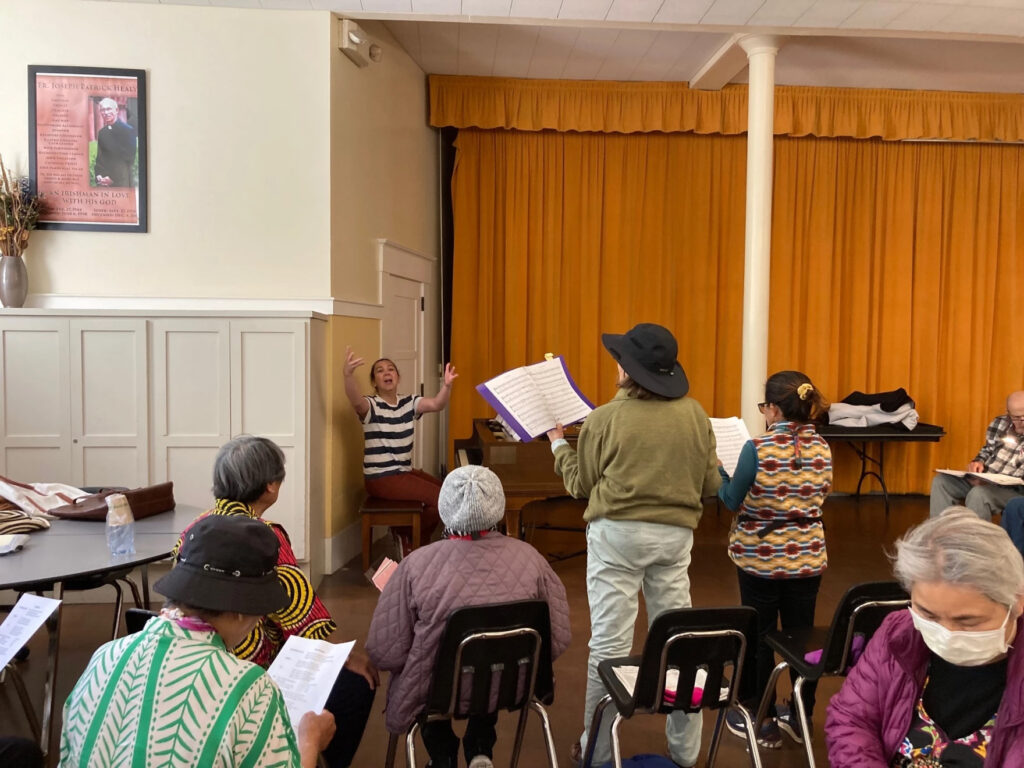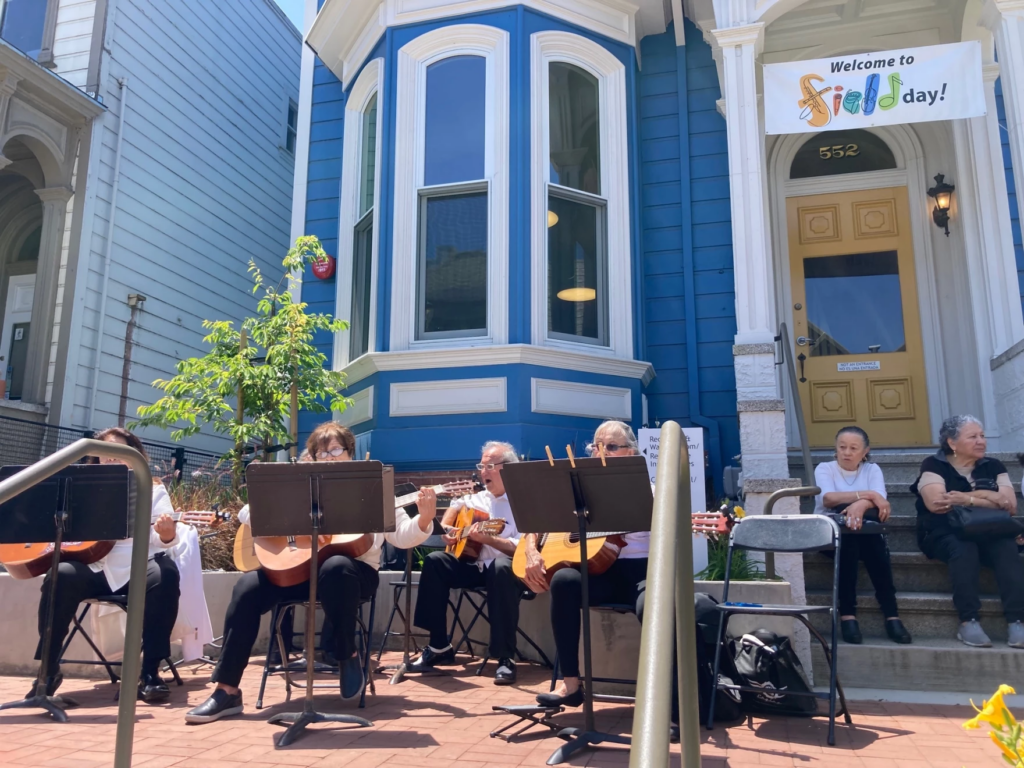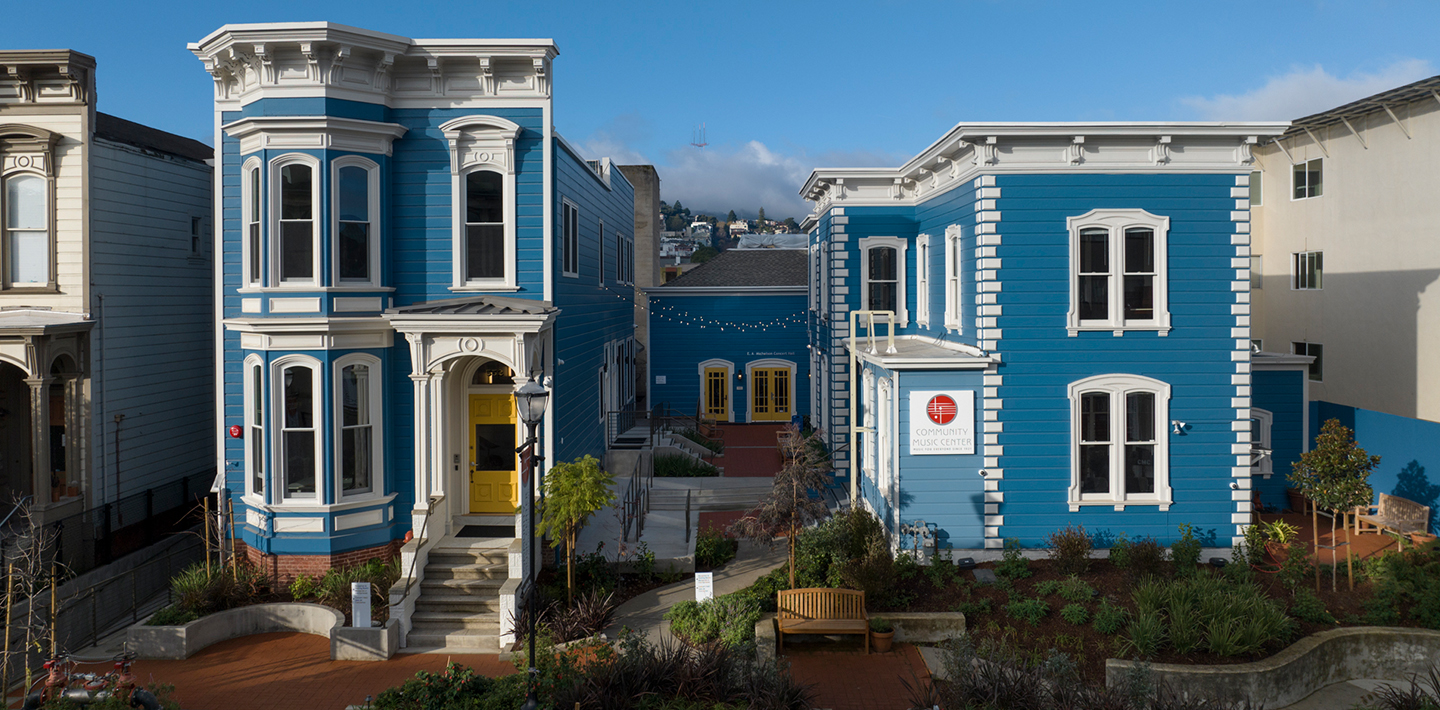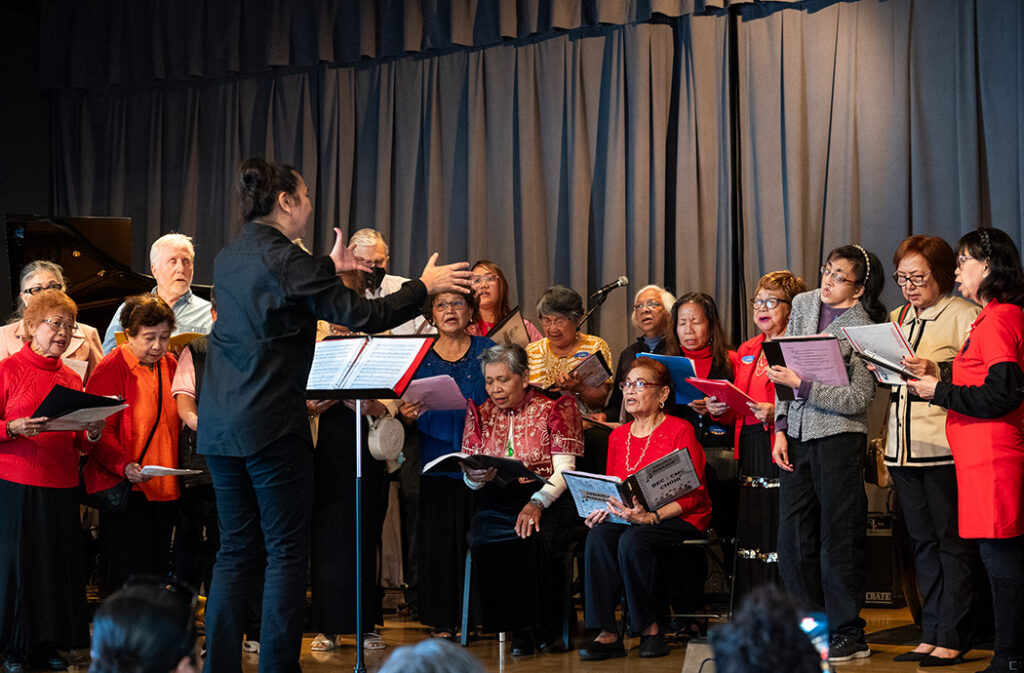July 8, 2024
KALW Radio Crosscurrents
Sheryl Kaskowitz
Twelve years ago, a UCSF researcher teamed up with city and nonprofit officials to launch a novel experiment meant to answer one question: can singing in a choir provide real health benefits for older adults?
In the social hall of the Most Holy Redeemer Catholic Church in San Francisco’s Castro district, a group of singers sit with their choir folders open, in rows of chairs around the grand piano.
There aren’t very many of them here today—just two sopranos, about three altos, four tenors, and two basses. A handful of singers also join on Zoom, through a phone perched on the piano.
This isn’t the church choir, though; it’s the Castro Neighborhood Choir for Older Adults and Adults with Disabilities—the singers are over 60, and they rehearse here, next to the Castro Senior Center, every Thursday afternoon.
Do we have enough chairs? More people are coming in …
Today, their conductor, Robin Estrada, has invited the members of another neighborhood choir she leads to join them here. This one serves the Filipino community at the Bayanihan Equity Center South of Market, and the two choirs are preparing to perform together this coming weekend.
One, and, go …

Community choruses are nothing new, but these groups are part of a network of neighborhood choirs that hatched out of a scientific experiment, more than 12 years ago.
Chris Tweedy was one of the original members of the Castro Choir.
UCSF Med Center had a call in the newspaper, San Francisco Chronicle, for singers, or people who haven’t been singing much, or who would like to start singing. Yes! That was me. . .
She says she wasn’t daunted by the fact that JOINING this choir was a bit unusual—involving a kind of physical exam that you might expect to do in a doctor’s office.
I joined the study, and it was so much fun. It was, we had to do physical demonstrations of how, how many, how many times we could sit down and stand up really fast. And, standing on one leg. And we did all kinds of stuff. … We were supposed to remember certain words and I failed at that.
The study was created by a team of researchers, city health officials, and community arts leaders, who all wanted to know—could a choir have scientifically proven health benefits for older adults?
Hi. I’m here to see Julene Johnson?
Today, I’ve come to one of the shiny new UCSF buildings in Mission Bay to hear how it all started.
So, my name is Julene Johnson, and I’m a professor at the University of California, San Francisco, in the Institute for Health and Aging.
And I’m by training a cognitive neuroscientist, but I also did my undergraduate degree in music. So, um, that kind of sets the stage for why I’m interested in music and brain and then ultimately aging.
In 2011, she received a Fulbright Fellowship to study aging in a country with a deep appreciation for community music—Finland.
And I spent six months hanging out with different choirs.
We’re listening to a recording she made of one of these choirs—called Kannel Kuoro.
And what was remarkable in the city called Jyväskylä, Finland, is they had fifty choirs, community choirs. That’s five zero. Fifty choirs in the community of 125,000 people. And it was just amazing because they also had six choirs that were dedicated to older adults.
Her study of over 100 older adults singing in these Finnish community choirs found that people who said the choirs were beneficial also had a higher quality of life.
So I came back all energized to the United States. And mainly because I was just so fascinated with this idea of using choirs to promote health and well being among older adults.
And serendipitously, at that same time, the National Institute on Aging came out with a call for grants that were asking for novel ways to promote, um, health and well being in the community. So to keep older adults engaged and active in the community. And I thought, wow, these could be the choirs, and we could do a larger study.
Julene connected with the Community Music Center (or CMC), which already ran two community choirs for older adults here in San Francisco.
She got the grant, and added the city’s Department of Aging and Adult Services to the partnership—now called the Community of Voices research study. The program expanded from those two community choirs to 12 neighborhood choirs at senior centers across the city.
They were much more than simple recreation — they were laboratories for a three-year, randomized trial about the potential health benefits of singing in a choir.
So we hypothesized that there would be improvements in the cognitive domain, physical domain, and emotional domain.
In 2018, After nearly six years, they released their findings.
They didn’t see any significant changes in the cognitive tests of memory and executive function, or in physical tests of things like walking speed and their ability to sit and stand quickly.
But here’s what they did find:
Older adults who sang in the choir had significantly reduced feelings of loneliness and also significantly increased what we call interest in life. So this is kind of the pep that you feel in the morning that says, you know, you get out of bed and you want to go somewhere and do something. So you feel you have some meaning.
This finding was important enough that, even after the UCSF study ended, the city has continued to fund the program, and the number of choirs has expanded to 15.
I’m able to see many of the neighborhood choirs in action today at CMC’s annual Field Day at its Mission district headquarters. It’s a marathon of short performances put on as a fundraiser, and several of the choirs take the stage throughout the afternoon. Singers find places to sit on the sunny courtyard as they wait for their turn to go on.

Oh, I’m 86 now, and the choir is the highlight of my week.
That’s Isabel Heredia. She is a long-time member of CMC’s original senior choir at the Mission Neighborhood Center, and she also sings with the choir at the Centro Latino.
And so it’s a joy for me, really. I live alone. And this is a lifesaver. Because there is no incentive really for people who are older and frail to get up in the morning. And if you have a date, you have to go, and you enjoy the company of the people you meet there. You get up, get dressed, and go out. And that is a big plus for seniors.
This issue of social isolation has gotten more attention recently. And it’s not just an issue for older adults.
. . . It’s because we’ve realized that loneliness is more than just a bad feeling. It has real consequences for our mental and physical health.
In 2023, U.S. Surgeon General Dr. Vivek Murthy issued an advisory declaring: an “epidemic of loneliness and isolation.”
So, however you look at it, loneliness and isolation are public health concerns that we have to prioritize.
It remains to be seen if community choirs will be widely embraced as a public health solution to this epidemic. But it makes sense to Julene Johnson:
If somebody shared with me they’re lonely, I might say, well, why don’t you join a choir?
The hope is that doctors and nurses could consider group singing as a kind of prescription against loneliness and isolation — at least encouraging people to try it out.



